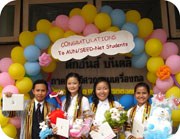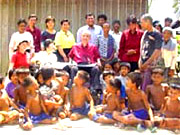JICA's Cooperation Projects
ASEAN University Network / South-East Asia Engineering Education Development Network Phase 2 (AUN/SEED-Net ll)
Promoting human resources development towards ASEAN integration
(1) Term of Cooperation
2008.3.11~2013.3.10
(2) Implementing Organization in Thailand
19 Member Institutions in 10 countries in ASEAN (Secretariat is stationed in Chulalongkorn University)
The Southeast Asia Engineering Education Development Network (SEED-Net) Project, which was officially established as an autonomous sub-network of the ASEAN University Network (AUN) in April 2001 (AUN/SEED-Net), aims at promoting human resources development in engineering in ASEAN. The Network consists of 19 leading institutions from 10 ASEAN countries with the support of 11 leading Japanese Supporting Universities.

It covers exchange programs of Master/Doctoral Degrees, field-wise seminars and collaborative research etc. It contributes to not only human resource development but also development of industry and community.
In March 2008, the project announced its start of Phase II. Interdisciplinary research is now one of the key activities on the region's common issues, namely Biotechnology, Disaster Mitigation & Management, Global Environment, Natural Resources & Materials, and New or Renewable Energy.
Please click here to get more information
The Regional Cooperation Project on Capacity Building of Drug Analysis for Improvement of Drug Law Enforcement Phase 2 (Drug II)
Tackling drug eradication with neighboring countries<
(1) Term of Cooperation
2006.9.25~2009.3.31
(2) Implementing Organization in Thailand
Office of Narcotics Control Board, Ministry of Justice
Not only people and goods but also undesirable things can cross borders in this region. One of these is drugs.
Thailand is making efforts to control drugs, but eradication of drugs is impossible in only one country. To solve this problem, all the countries in this region have to strive together.
Therefore, JICA is conducting a regional cooperation project. We expect improvement of drug analysis and reinforcement of drug control.

Asia-Pacific Development Center on Disability Project Phase 2 (APCD II)
Empowerment of persons with disabilities as agents of change towards a fair society for all
(1) Term of Cooperation
2007.8.1~2012.7.31
(2) Implementing Organization in Thailand
Asia-Pacific Development Center on Disability, National Office for Empowerment of Persons with Disabilities, Ministry of Social Development and Human Security
APCD is the center for promoting networking and collaboration among governmental organizations, NGOs and International Organizations in order to promote a barrier-free society and empowerment of persons with disabilities.
In the Asia and Pacific region, there are about 400 million persons with disabilities. As most of them remain marginalized from society, they cannot have opportunities to go to school, to work and so on.

On the other hand, APCD regards persons with disabilities as agents of change; Establishment of self-help groups of persons with disabilities helps their family members decrease their burden. Barrier-free promotion for public transportation is preferable not only for persons with disabilities but also for elderly persons, expectant mothers and so on. APCD contributes to enhancing Quality of Life (QOL) of both persons with disabilities and those without disabilities.





scroll